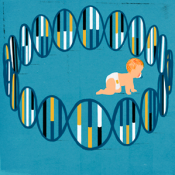The Dawn of CRISPR Mutants
By Eben Kirksey,
Sapiens
| 01. 27. 2021
Surreal artwork in the hotel lobby—a gorilla peeking out of a peeled orange, smoking a cigarette; an astronaut riding a cyborg giraffe—was the backdrop for bombshell news rocking the world. In November 2018, Hong Kong’s Le Méridien Cyberport hotel became the epicenter of controversy about Jiankui He, a Chinese researcher who was staying there when a journalist revealed he had created the world’s first “edited” babies. Select experts were gathering in the hotel for the Second International Summit on Human Genome Editing—a meeting that had been called to deliberate about the future of the human species. As CNN called the experiment “monstrous,” as heated discussions took place in labs and living rooms around the globe, He sat uncomfortably on a couch in the lobby.
He was trying to explain himself to Jennifer Doudna, the chemist at UC Berkeley, who is one of the pioneers behind CRISPR, a new genetic-engineering tool. Doudna had predicted that CRISPR would be used to direct the evolution of our species,* writing, “We possess the ability to edit not only the DNA of every living...
Related Articles
By Scott Solomon, The MIT Press Reader | 02.12.2026
Chris Mason is a man in a hurry.
“Sometimes walking from the subway to the lab takes too long, so I’ll start running,” he told me over breakfast at a bistro near his home in Brooklyn on a crisp...
By Diaa Hadid and Shweta Desai, NPR | 01.29.2026
MUMBRA, India — The afternoon sun shines on the woman in a commuter-town café, highlighting her almond-shaped eyes and pale skin, a look often sought after by couples who need an egg to have a baby.
"I have good eggs,"...
By George Janes, BioNews | 01.12.2026
A heart attack patient has become the first person to be treated in a clinical trial of an experimental gene therapy, which aims to strengthen blood vessels after coronary bypass surgery.
Coronary artery bypass surgery is performed to treat...
By Staff, ScienceDaily | 01.05.2026
Scientists at UNSW Sydney have developed a new form of CRISPR technology that could make gene therapy safer while also resolving a decades-long debate about how genes are switched off. The research shows that small chemical markers attached to DNA
...




